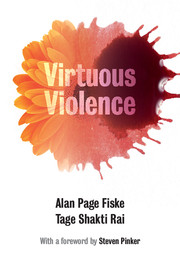Book contents
- Frontmatter
- Dedication
- Contents
- Figures and tables
- Foreword
- Warm thanks
- The point
- 1 Why are people violent?
- 2 Violence is morally motivated to regulate social relationships
- 3 Defense, punishment, and vengeance
- 4 The right and obligation of parents, police, kings, and gods to violently enforce their authority
- 5 Contests of violence: fighting for respect and solidarity
- 6 Honor and shame
- 7 War
- 8 Violence to obey, honor, and connect with the gods
- 9 On relational morality: what are its boundaries, what guides it, and how is it computed?
- 10 The prevailing wisdom
- 11 Intimate partner violence
- 12 Rape
- 13 Making them one with us: initiation, clitoridectomy, infibulation, circumcision, and castration
- 14 Torture
- 15 Homicide: he had it coming
- 16 Ethnic violence and genocide
- Chapter 17 Self-harm and suicide
- 18 Violent bereavement
- 19 Non-bodily violence: robbery
- 20 The specific form of violence for constituting each relational model
- 21 Why do people use violence to constitute their social relationships, rather than using some other medium?
- 22 Metarelational models that inhibit or provide alternatives to violence
- 23 How do we end violence?
- 24 Evolutionary, philosophical, legal, psychological, and research implications
- The dénouement
- References
- Index
7 - War
Published online by Cambridge University Press: 05 December 2014
- Frontmatter
- Dedication
- Contents
- Figures and tables
- Foreword
- Warm thanks
- The point
- 1 Why are people violent?
- 2 Violence is morally motivated to regulate social relationships
- 3 Defense, punishment, and vengeance
- 4 The right and obligation of parents, police, kings, and gods to violently enforce their authority
- 5 Contests of violence: fighting for respect and solidarity
- 6 Honor and shame
- 7 War
- 8 Violence to obey, honor, and connect with the gods
- 9 On relational morality: what are its boundaries, what guides it, and how is it computed?
- 10 The prevailing wisdom
- 11 Intimate partner violence
- 12 Rape
- 13 Making them one with us: initiation, clitoridectomy, infibulation, circumcision, and castration
- 14 Torture
- 15 Homicide: he had it coming
- 16 Ethnic violence and genocide
- Chapter 17 Self-harm and suicide
- 18 Violent bereavement
- 19 Non-bodily violence: robbery
- 20 The specific form of violence for constituting each relational model
- 21 Why do people use violence to constitute their social relationships, rather than using some other medium?
- 22 Metarelational models that inhibit or provide alternatives to violence
- 23 How do we end violence?
- 24 Evolutionary, philosophical, legal, psychological, and research implications
- The dénouement
- References
- Index
Summary
Duty, Honor, Country: Those three hallowed words reverently dictate what you ought to be, what you can be, what you will be … Duty, Honor, Country: The code which those words perpetuate embraces the highest moral laws and will stand the test of any ethics or philosophies ever promulgated for the uplift of mankind. Its requirements are for the things that are right, and its restraints are from the things that are wrong. The soldier, above all other men, is required to practice the greatest act of religious training – sacrifice. In battle, and in the face of danger and death, he discloses those divine attributes which his Maker gave when He created man in His own image. No physical courage and no brute instinct can take the place of the divine help which alone can sustain him. However horrible the incidents of war may be, the soldier who is called upon to offer and to give his life for his country is the noblest development of mankind… Yours is the profession of arms, the will to win, the sure knowledge that in war there is no substitute for victory; that if you lose, the nation will be destroyed; that the very obsession of your public service must be: Duty, Honor, Country.
General Douglas MacArthur (1962)It is not only warrior cultures, honor cultures, or street gangs that require men to be violent: in war, people in most cultures and subcultures deem it a moral duty to kill the enemy – and in many cases soldiers feel that they should kill, enslave, torture, rape, or starve enemy captives or civilians. Philosophers and religious leaders often exhort men (and sometimes women) to fight, extolling the noble virtues of warfare. In the twentieth century, soldiers killed approximately 140 million people and wounded far more; in most cases they were morally motivated to do so out of solidarity in support of fellow soldiers, obedience to officers, military honor, or patriotism (Leitenberg, 2006; this number includes deaths in German and Japanese concentration camps).
- Type
- Chapter
- Information
- Virtuous ViolenceHurting and Killing to Create, Sustain, End, and Honor Social Relationships, pp. 93 - 106Publisher: Cambridge University PressPrint publication year: 2014
- 1
- Cited by

